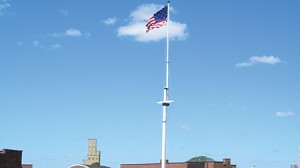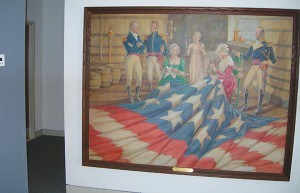The Star Spangled Banner turned 200 on Sunday, September 14, 2014.
In 2008, my aunt Joanie took Paul and I to Baltimore While we were there, we went to Fort McHenry. The absolute best presentation you can ever see on the Star Spangled Banner is the movie shown at Fort McHenry in Chesapeake Bay. It is so well done that anyone who doesn’t come to tears at the end of this presentation has a very cold heart. The presentation shows the meaning of the words and why they were so dear to Francis Scott Key.
The history of our national anthem began in Chesapeake Bay during the Battle of Fort McHenry in Baltimore during the War of 1812. Francis Scott Key, a 35 year old Washington lawyer and amateur poet had come to Baltimore to secure the release of Dr. William Beanes, a civilian who had been taken prisoner of war by the British on a truce ship. Key wasn’t allowed to leave the ship because the British Commander stated that it was a moot point because he felt by the next day the British will be victorious and rule the Colonies once more.
During the battle (Battle of Fort McHenry), Key was told by the British that if the (oversized) American flag at Fort McHenry was flown at half-mast then it was a sign that the Americans had surrendered and were under British rule. Key looked into Chesapeake Bay and saw hundreds of British ships. The Commander could not understand why the Americans fought so hard. Key responded, “We would rather die with our legs standing then live with our knees bent to a king.”
The battle raged all night long and rockets lit up the sky so bright it seemed like it was broad daylight. All night long the British bombarded Fort McHenry. Key would go up on the deck of the truce ship and saw that the flag was still there and told the prisoners of war this. By the next morning, Key saw that the flag flown at the rampart at Fort McHenry, although tattered, was still there. Patriots had held the flag despite the bombardment of British fire. Key wrote a poem called “Defence of Fort M’Henry” which would later be renamed “The Star-Spangled Banner” and officially become the United States’ national anthem in March 3, 1931.
K.M.
As I mentioned before, I listen to a lot of talk radio shows. Yesterday (September 14, 2014), one of the hosts mentioned it was the 200th anniversary of the Star-Spangled Banner. I immediately started to recite the words in my head and I thought to myself that these words resonated in situations that we have today.
There is no place on the earth that is perfect. I mentioned briefly in last week’s editorial that you have Americans who have turned against our country and are hell bent on destroying it. There are Americans in all walks of life who constantly tear down the United States. They are fortunate that they are living in a country that allows them to speak these harsh words. But would those same people go to the border and tell anyone crossing into the United States illegally not to come here because it is a terrible place to live. Let’s take it a step further – would they be willing if they could give up their citizenship and grant it to someone coming here illegally and go to the country where those illegal aliens escaped from?
Look at some of the words in the Star-Spangled Banner: There are still rocket’s red glare and bombs bursting in air today. The raising of a flag is synonymous with victory or honor. As always your perspectives and responses on any subject manor in our editorials are appreciated. God Bless America!
C.M.
The Star Spangled Banner Lyrics
By Francis Scott Key 1814
Oh, say can you see by the dawn’s early light
What so proudly we hailed at the twilight’s last gleaming?
Whose broad stripes and bright stars thru the perilous fight,
O’er the ramparts we watched were so gallantly streaming?
And the rocket’s red glare, the bombs bursting in air,
Gave proof through the night that our flag was still there.
Oh, say does that star-spangled banner yet wave
O’er the land of the free and the home of the brave?
On the shore, dimly seen through the mists of the deep,
Where the foe’s haughty host in dread silence reposes,
What is that which the breeze, o’er the towering steep,
As it fitfully blows, half conceals, half discloses?
Now it catches the gleam of the morning’s first beam,
In full glory reflected now shines in the stream:
‘Tis the star-spangled banner! Oh long may it wave
O’er the land of the free and the home of the brave!
And where is that band who so vauntingly swore
That the havoc of war and the battle’s confusion,
A home and a country should leave us no more!
Their blood has washed out their foul footsteps’ pollution.
No refuge could save the hireling and slave
From the terror of flight, or the gloom of the grave:
And the star-spangled banner in triumph doth wave
O’er the land of the free and the home of the brave!
Oh! thus be it ever, when freemen shall stand
Between their loved home and the war’s desolation!
Blest with victory and peace, may the heav’n rescued land
Praise the Power that hath made and preserved us a nation.
Then conquer we must, when our cause it is just,
And this be our motto: “In God is our trust.”
And the star-spangled banner in triumph shall wave
O’er the land of the free and the home of the brave!




